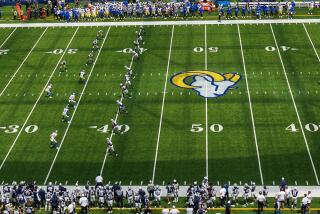Officials Will Tuck Into Rule
- Share via
The “tuck rule” will be a subject of discussion at next week’s NFL meetings, although that’s of little consolation to the Oakland Raiders.
Their playoff loss at New England hinged on a play that was initially ruled a fumble by quarterback Tom Brady, then was overturned after a replay review. Brady was saved by the tuck rule, which says a quarterback who stops in the act of throwing can only be said to have fumbled if the ball is completely tucked into his body.
“We think about [the play] every day,” Raider executive Bruce Allen said. “It was a fumble.”
Tampa Bay General Manager Rich McKay, chairman of the league’s competition committee, said in a conference call Wednesday that the rule will be discussed but change is not in the offing.
“We’re not even close to a consensus,” he said.
The meetings, which begin Sunday at Orlando, Fla., will be attended by owners, general managers and coaches--except Tampa Bay’s Jon Gruden (busy assembling his coaching staff) and San Diego’s Marty Schottenheimer (scouting players).
Among the other issues to be examined:
* Sportsmanship, the focal point of the meetings last spring, again will be emphasized because of a rash of unnecessary roughness penalties. McKay said the league has done a much better job enforcing rules that protect the quarterback. Only 41 quarterbacks were injured last season, down from 86 in 2001.
* The league plans to crack down on music and artificial crowd noise piped through stadium speakers when the visiting offense is in the huddle. The practice will be outlawed when the visiting team has the ball and the clock is running.
* Instant replay will be discussed, but only minor changes such as making sure officials immediately put a halt to the action when a play is challenged. It was a delayed response that triggered the crowd’s bottle-throwing reaction during a game at Cleveland.
Although there will be no Super Bowls awarded at these meetings, the subject of staging future Super Bowls in New York and Washington will be discussed. Currently, the league rule mandates the average January temperature for a host city must be 50 degrees or warmer.
“There are two schools of thought about that,” said Joe Browne, one of the league’s senior vice presidents. “Either we change that [50-degree rule] or we consider Washington and New York separately.”
More to Read
Go beyond the scoreboard
Get the latest on L.A.'s teams in the daily Sports Report newsletter.
You may occasionally receive promotional content from the Los Angeles Times.











